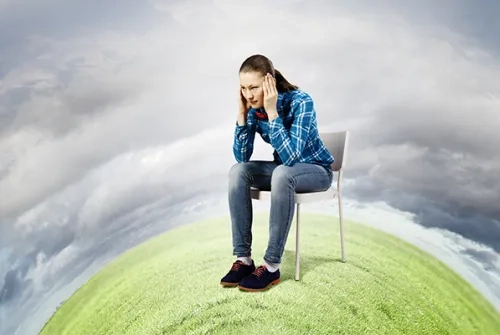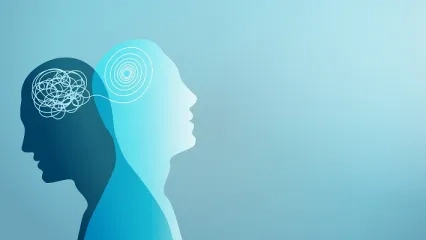Alo Yeditepe
Alo Yeditepe
Eco-Anxiety Can Cause Panic Attacks
Eco-anxiety, which we've heard a lot about lately, is a somewhat necessary response to protect our planet, which is actually our home, according to experts. Experts, however, warn that excessive eco-anxiety can lead to anxiety attacks, tantrums, and even aggressive reactions that can lead to panic attacks.
Yeditepe University Hospitals Psychiatrist Prof. Dr. Okan Taycan answered our questions about eco-anxiety. Stating that eco-anxiety is a natural response to the threat of human destruction on our home planet, Prof. Dr. Taycan said, “Eco-anxiety is a signal that we need to do something for our world, in most cases it is not an aberration or disorder that can be corrected by medical intervention. Of course, it can be extreme for some people. But the solution here is to take a social stance rather than individual prescriptions".
Reminding that we have been and continue to be very rude to our home, that is to our planet, Prof. Dr. Taycan pointed out that although every relationship is based on reciprocity, people experience the illusion that their relationship with their environment is one-sided. Saying, “We believed that the world would never end no matter how much we consume our resources, and that nature would renew itself no matter how much we pollute our environment,” said Taycan, and continued his words as follows: But the facts are solid and ultimately, with the irresponsible destruction of nature by humans, the environmental disaster called climate change knocked on our door and was slammed in our faces in all its reality. Some call this process we are in as 'global extinction', which is clearly where we will reach if we fail to change the course.”
Suicide Rates Rise Among Farmers
Stating that nature reacts in many ways from flood disasters to forest fires, from cardiovascular diseases caused by air pollution to epidemics, Prof. Dr. Taycan said: “It is inevitable that climate change, which destroys our social structure and physical health, will also have some effects on our mental health. Climate change, after the environmental disasters it directly causes, causes symptoms such as post-traumatic stress disorder, depression, various anxiety disorders, as well as feelings of helplessness and loss, aggression, suicide rates, and hopelessness in the long-term with the accumulation of stress. Suicide rates are increasing in many parts of the world among farmers who cannot get enough crops and have economic difficulties due to drought. For example, it has been reported that 30 farmers in India committed suicide in the last 60 years due to drought.”
It Makes You Sick Physically, Too
Reminding that people had to leave their places due to drought, sea level rise and extreme heat, Prof. Dr. Okan Taycan continued,
“Although forced migration is a trauma in itself, leaving the place where a person was born and raised with deep ties leads to a feeling of intense loss, loss of purpose and meaning. In addition to all these, our polluted air, water and depleted resources also cause us to get sick physically; For example, it causes sleep problems, forgetfulness, suppression of the immune system, changes in our eating habits and an increase in gastrointestinal problems.
When Does It Become Pathological?
Expressing that the word "eco" means "home" in Greek, Taycan said, "Therefore, eco-anxiety is actually a natural reaction we show against the threat of human destruction on our home planet."
Reminding that anxiety, in its essence, enables us to continue our lives, to take precautions and take action against possible threats, Taycan continued as follows:
“In this context, we can say that some eco-anxiety is necessary and healthy for us to save our planet before it's too late. However, when our environmental anxiety becomes more severe than expected or goes out of control for longer than necessary, impairing our functioning and interpersonal communication, then we can speak of a pathological eco-anxiety or an echo-anxiety-related disorder. Excessive eco-anxiety can cause extreme sadness and restlessness about environmental news and the course of the world in some people, anxiety attacks, anger tantrums and even aggression reactions in some cases, while in some people, on the contrary, avoidance of ecological issues, helplessness, hopelessness and even in extreme situations. It can lead to reactions that can go as far as denial. It should be emphasized here that the mental effects of climate change, especially eco-anxiety, should not be medicalized. I would particularly like to add that while doing all these, we must fall into the trap of anthropocentrism. We should only know that a solution is not possible without an understanding that encompasses all living and non-living beings of which we are a part and live together. We cannot be healthy when our world is sick.”
Prof. Dr. Taycan noted that:
“However, whenever our environmental anxiety becomes more severe than expected or goes out of control for longer than necessary, impairing our functioning and interpersonal communication, then we can speak of a pathological eco-anxiety or an echo-anxiety-related disorder. Excessive eco-anxiety can lead to extreme sadness and restlessness about environmental news and the course of the world in some people, anxiety attacks lead to panic attacks, anger tantrums, and even aggression reactions in some cases, while in some people, on the contrary, avoidance of ecological issues, helplessness, hopelessness and even in extreme situations, it can lead to reactions that can go as far as a denial. Here, it should be emphasized that the psychological effects of climate change, especially eco-anxiety are not medicalized. I would especially like to add that we should not fall into the trap of human centrism while doing all these. We must know that a solution is not possible without an understanding that encompasses all animate and inanimate beings that we are only a part of and that we live together. We cannot be healthy while our world is sick.”
Press Coverage: sabah | gazetevatan | haberler | beyazgazete
About
Faculty and Year of Graduation:
İstanbul University Cerrahpaşa Medical Faculty
Alo Yeditepe




